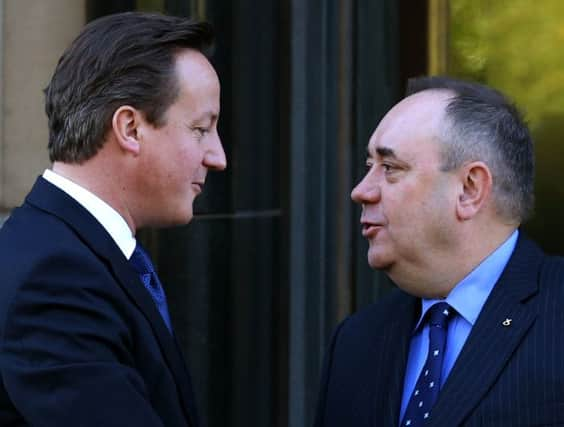Comment: Devo-max grey area may mean neverendum


Now that the independence debate has been boiled down to a straightforward choice of either being in the UK or out of it, there would appear to be little point in bothering with something that isn’t on offer.
But the absence of an indy-lite/devo-max third option does not mean that the concept is entirely redundant as far as the Yes and No strategists are concerned – far from it.
Advertisement
Hide AdAdvertisement
Hide AdGiven that the polls indicate substantial support for Scotland receiving more powers short of outright independence, there is an almighty scrap for the votes of those who believe that Scotland would flourish with more autonomy within the UK.
The unionist parties are attempting to woo this important section of the electorate with their working groups and commissions on strengthening devolution.
Meanwhile, the Yes campaign has identified the support of these indy-lite voters as being absolutely critical to their chances of overturning the opinion polls. Of course, Yes strategists recognise that there are many people who have deep reservations about the sort of independence on offer in the Scottish Government’s white paper. They’d be fools not to, given the stooshies over the currency, EU membership and recent questions over the legality of plans to charge English, Welsh and Northern Irish students fees.
In the coming weeks, the Yes campaign hope to persuade the indy-lite believers that only a Yes vote can secure their vision for Scotland’s constitutional future.
Independence is the only available option on the ballot paper to guarantee more powers without Scotland becoming caught up in yet more impenetrable Calman-style commissions, the argument goes.
A Yes vote, according to the pro-independence strategists, would also have the merit of settling the issue once and for all.
Yes campaigners argue that a 51 per cent vote in favour of independence puts Scotland on an irreversible path to radical change from which there is no turning back. In contrast, anything other than a thumping No majority leaves the issue to rumble on (despite SNP promises that this year’s referendum should settle the issue for a generation). That sort of argument, designed to appeal to the indy-lites, should send shivers of alarm through those who live in fear of Scottish neverendums.
The No camp may be in a commanding position in the polls at the moment. But should it succeed in defeating the Yes challenge, it would be in its interests to insist that a win is a win – whether it be by an inch or a mile.